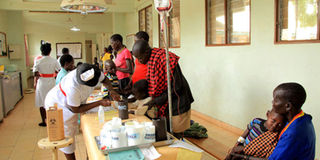Salaried workers to pay Shs3 trillion in insurance

Treatment. Health workers at St Kizito Matany Hospital in Napaka District attend to patients on June 25. Government expects to collect at least Shs3 trillion from the National Health Insurance Scheme every year. PHOTO BY RACHEL MABALA
What you need to know:
- According to the draft Bill, every employee above 18 years is supposed to contribute 4 per cent of their monthly salary towards the scheme, while the employer will contribute one per cent, making it five per cent.
- Data from the Ministry of Health indicates that the current total annual health expenditure stands at Shs7.5 trillion.
Kampala. Government expects to collect at least Shs3 trillion from the National Health Insurance Scheme (NHIS) every year, Ministry of Health has revealed.
This would be equivalent to at least 7.4 per cent of the Shs40.5 trillion of the 2019/2020 national budget.
Last month Cabinet approved the National Health Insurance Bill 2019 which Minister of Health Jane Ruth Aceng is expected to table in Parliament anytime.
The commissioner for planning, financing and policy in Ministry of Health, Dr Sarah Byakika, while presenting highlights of the Bill during a media breakfast meeting in Kampala yesterday, said: “The average annual contribution for this scheme we are looking at will be about averagely Shs3 trillion per year once it has stabilised. The current government funding to health is Shs2.86 trillion. This contributes to 15 per cent of the total health expenditure.”
Dr Byakika added: “We do not want to overburden the people by putting high contributions. So we will start with what was modelled as affordable based on the social economic status but as the country develops and revenue increases, the package can be expanded.”
According to the draft Bill, every employee above 18 years is supposed to contribute 4 per cent of their monthly salary towards the scheme, while the employer will contribute one per cent, making it five per cent.
Individuals employed in the informal sector will pay Shs100, 000 annually.
Those proposed to be exempted from contributing to the scheme are the underprivileged people such as the poor who can hardly earn $1.5 (about Shs5,462) a day; persons with disabilities; the elderly; orphans; and street children.
However, these categories of people will be issued with insurance cards from the government to access health services.
According to the Bill, if passed into law, employers who will not remit their employees contributions will be fined two times the amount supposed to be contributed.
“An employer who fails without lawful excuse to pay, within the time and in the manner prescribed by this Act commits an offence and is liable to penalty equal to two times the amount of the contribution,” Dr Byakika said while quoting the Bill.
Dr Diana Atwine, the Permanent Secretary in the Ministry of Health, said only four children will benefit from the parents’ scheme and parents will have to incur additional cost for the rest of the children.
“It’s also going to cause us to start being cautious of having big families. For now the scheme will start with four children. May be with time we are going to extend beyond four children. So young people who want to have children bear that in mind,” Dr Atwine said.
She added that the scheme will end “under table payments” which refers to the illegal payments patients make to medical workers to access healthcare services.
Data from the Ministry of Health indicates that the current total annual health expenditure stands at Shs7.5 trillion. Of this, 15 per cent is from government funding, 42 per cent from donors, 41 per cent from individuals (out of pocket) when they fall sick and only two per cent from pre-payment mechanisms.



